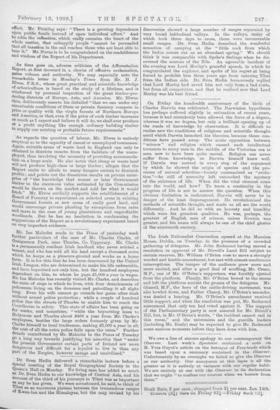On Friday the hundredth anniversary of the birth of Charles
Darwin was celebrated. The Darwinian hypothesis has perhaps suffered slightly in estimation of recent years, because it had mistakenly been allowed the force of a dogma, whereas it was no dogma, but only a brilliant opening up of the roads of knowledge by observation. It is difficult to realise now the conditions of religious and scientific thought amid which Darwin launched his theories, because those con- ditions have passed away. The acute opposition between " science " and religion which caused such intellectual torments to many men in the middle of the Victorian era is seen now to have been quite unreal. Religion can never suffer from knowledge, as Darwin himself knew well. If Darwin was correct in every step of the argument by which he showed the origin of species and the pro- cesses of natural selection—loosely summarised as "evolu- tion "—he still of necessity left untouched the mystery of the existence of life. When did the vital element come into the world, and how P To trace a continuity in the progress of life is not to answer the question. When this obvious limitation is understood, Darwin will never be in danger of the least disparagement. Ho revolutionised the methods of scientific thought, and made us all see the world differently. And he did so with an honesty and humility which were his grandest qualities. He was, perhaps, the greatest of English men of science, unless Newton was greater, and his name will always be one of the chief glories of the nineteenth century.









































 Previous page
Previous page